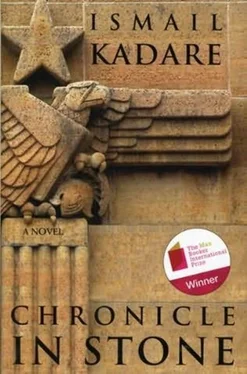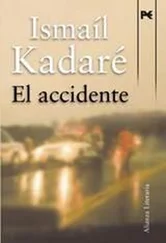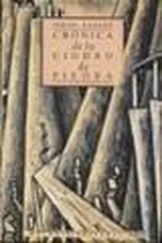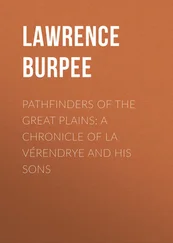Ismaíl Kadaré - Chronicle in Stone
Здесь есть возможность читать онлайн «Ismaíl Kadaré - Chronicle in Stone» весь текст электронной книги совершенно бесплатно (целиком полную версию без сокращений). В некоторых случаях можно слушать аудио, скачать через торрент в формате fb2 и присутствует краткое содержание. Жанр: Современная проза, на английском языке. Описание произведения, (предисловие) а так же отзывы посетителей доступны на портале библиотеки ЛибКат.
- Название:Chronicle in Stone
- Автор:
- Жанр:
- Год:неизвестен
- ISBN:нет данных
- Рейтинг книги:4 / 5. Голосов: 1
-
Избранное:Добавить в избранное
- Отзывы:
-
Ваша оценка:
- 80
- 1
- 2
- 3
- 4
- 5
Chronicle in Stone: краткое содержание, описание и аннотация
Предлагаем к чтению аннотацию, описание, краткое содержание или предисловие (зависит от того, что написал сам автор книги «Chronicle in Stone»). Если вы не нашли необходимую информацию о книге — напишите в комментариях, мы постараемся отыскать её.
Chronicle in Stone — читать онлайн бесплатно полную книгу (весь текст) целиком
Ниже представлен текст книги, разбитый по страницам. Система сохранения места последней прочитанной страницы, позволяет с удобством читать онлайн бесплатно книгу «Chronicle in Stone», без необходимости каждый раз заново искать на чём Вы остановились. Поставьте закладку, и сможете в любой момент перейти на страницу, на которой закончили чтение.
Интервал:
Закладка:
Now it was obvious: witchcraft was rampant throughout town. Invisible hands scattered evil objects everywhere: under doorsteps, behind walls, under eaves, wrapped in old papers or dirty rags that made you shudder. People said that a spell had been cast on the house of the Cutes, where the brothers hated each other and the quarrelling was endless. The same happened to the house of Dino Çiço, the city’s lone inventor, whose calculations were now thrown off by the magic. Furthermore, the behaviour of certain young girls in recent days could be explained only as a consequence of the practice of witchcraft.
In our house we were waiting for Xhexho. And come she did, breathing heavily as always, her nasal voice booming as she walked through the gate. “Have you heard, poor things?” she called from the steps. “Babaramo’s daughter-in-law’s milk has run dry.”
“God help us,” my mother said, going green in the face.
“You should see what happened there. They looked all over for the magic ball, on the ceiling, under the floorboards. They turned over the mattresses, emptied all the chests. They turned the whole house upside down until they finally found it.”
“They found it?”
“They did. Right in the baby’s cradle: nails and hair of the dead. You should have seen them! Wailing and crying. They kept it up until the oldest son came home and went to tell the police.”
“It’s the work of witches,” my mother said. “Why can’t they find them?”
“Has anything happened at your place?” asked Xhexho.
“No,” said Grandmother. “Not so far.”
“That’s good.”
“Witches,” my mother kept repeating.
“What about Nazo’s boy?” Xhexho asked. “Have they managed to get rid of his curse?”
“Not yet,” said Grandmother. “They called the hodja twice but nothing yet. They’ve turned the house upside down looking for the magic, but they can’t find it.”
“Too bad,” said Xhexho. “Such a good-looking boy!”
I had heard about this business with Maksut, Nazo’s son. He had been married just a short time when the rumour started that a spell had done something to him. Ilir had heard about it at home and told us. We were very curious to find out what was going on in that house which had been struck by a spell. Not until much later did I understand that it had affected Maksut’s performance of his conjugal duties. We would sit by their door for hours, but it seemed that nothing unusual ever happened. Behind the windows everything was as quiet as it had always been. Nazo and her daughter-in-law still hung the clothes out to dry in the yard and the grey tomcat invariably lay on the roof warming itself in the sun.
“What kind of spell is this?” we asked each other. “No screaming. No hair-pulling.”
One day I asked Grandmother, “What is this spell on Nazo’s boy?”
“Listen,” Grandmother said, “these are shameful things you shouldn’t talk about at your age. Got that?”
I told my friends and they got even more curious. In the evening, when the hodja was praying in the mosque and the storks’ nests atop the chimneys and minarets looked like black turbans, we went to wait outside Nazo’s house to see the young bride. She came out and sat with her mother-in-law on a stone bench near the door. Her fingers toyed with her long braids and a strange, fascinating light flashed in her eyes now and then. Our neighbourhood had never seen such a splendid bride. Among ourselves we called her “the beautiful bride”, and we liked it when she looked at us as we ran past Nazo’s front door chasing fireflies in the twilight. She would sit there watching us with her big grey eyes, but her mind seemed elsewhere. Then Maksut would come home from the market or the coffee house carrying a big loaf of bread under his arm. The bride and her mother-in-law would get up silently from the stone bench and he would follow them inside, closing the heavy door, which creaked plaintively, behind him.
Behind that stone threshold, the spell must have been working. We felt sorry for the beautiful bride who disappeared every night behind that grim door. The street seemed empty, and we didn’t feel like playing any more. Through the window we watched Nazo light the kerosene lamp, whose dim yellow light would have depressed anyone.
“Yes, Selfixhe,” said Xhexho, “it’s all our own fault. People have just gone too far. They say that in a few days all the men and women of the city are going to parade through the streets with flags and music, shouting ‘Long live shit!’ Has anyone ever seen such an abomination?”
Mother pinched her cheeks, which was a way of saying how upset she was.
“It’s the end of the world!”
“How disgraceful! How disgraceful!” Grand mother said.
“Who knows what’s next?” said Xhexho. “But He on high,” she went on, pointing up as she always did, “He may take His time, but He never forgets. Yesterday He made Çeço Kaili’s daughter grow a beard, tomorrow He will make all our bodies sprout thorns.”
“God save us!” my mother cried.
Before she left, Xhexho gave us some advice. Whenever she gave advice, her voice got even more nasal. “When you cut your nails, don’t leave the clippings around. Burn them, so nobody can find them.”
“Why?”
“Because they use nail clippings for witchcraft, boy. And you, my girl, I beg you, when you comb your hair, be careful not to leave any tufts around, because the devil lies in wait for just such things.”
“God save us!” my mother said once again.
“And bury the ashes from the fireplace too!”
Xhexho left as she had come, wrapped in black, and still wheezing. She left fear and unease in her wake, as she always did. That’s how I remember her, always agitated and consumed with worry, never talking about anything pleasant, only about dark things, seemingly invigorated by them. Ilir suspected her of practising magic and casting spells herself.
Magic was now the constant topic of conversation in every home. In the beginning, after the first events, there was a kind of perplexity. Then, as is usual in such cases, once the uncertainty had passed, people started looking for the root of the evil, for the cause. The “old crones” were consulted. These were aged women who could never be surprised or frightened by anything any more. They had long since stopped going out of their houses, for they found the world boring. To them even major events like epidemics, floods and wars were only repetitions of what they had seen before. They had already been old ladies in the thirties, under the monarchy, and even before, under the republic in the mid-twenties. In fact, they were old during the First World War and even before, at the turn of the century. Granny Hadje had not been out of her house in twenty-two years. One old woman of the Zeka family had been inside for twenty-three years. Granny Neslihan had last gone out thirteen years before, to bury her last grandson. Granny Shano spent thirty-one years inside until one day she went out into the street a few yards in front of her house to assault an Italian officer who was making eyes at her great-granddaughter. These crones were very robust, all nerve and bone, even though they ate very little and smoked and drank coffee all day long. When Granny Shano grabbed the Italian officer by the ear, he let out a great yelp, drew his pistol, and rapped the old woman’s hand with the butt. Not only did she refuse to let go, she punched him with her bony hands. The crones had very little flesh on their bones, and few vulnerable spots. Their bodies were like corpses ready for embalming, from which all innards likely to rot had already been removed. Superfluous emotions like curiosity, fear and lust for gossip or excitement had been shed along with the useless flesh and excess fat. Javer once said that Granny Shano could as easily have grabbed the ear of Benito Mussolini himself as the Italian officer’s.
Читать дальшеИнтервал:
Закладка:
Похожие книги на «Chronicle in Stone»
Представляем Вашему вниманию похожие книги на «Chronicle in Stone» списком для выбора. Мы отобрали схожую по названию и смыслу литературу в надежде предоставить читателям больше вариантов отыскать новые, интересные, ещё непрочитанные произведения.
Обсуждение, отзывы о книге «Chronicle in Stone» и просто собственные мнения читателей. Оставьте ваши комментарии, напишите, что Вы думаете о произведении, его смысле или главных героях. Укажите что конкретно понравилось, а что нет, и почему Вы так считаете.












